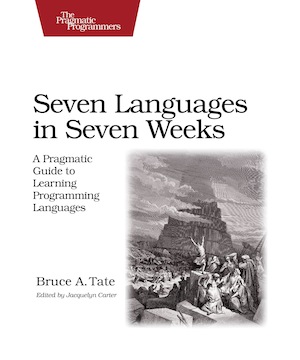Закончил ускоренное чтение по диагонали книги "
Seven languages in seven weeks", автор Bruce Tate.

В моей версии это было "Семь языков за семь вечеров". Для каждого языка дается минимальное введение, которое имеет смысл только если язык для вас вообще новый. Еще приводятся мини интервью с создателями языков, и один из интересных задаваемых им вопросов - это "чтобы вы сделали в языке иначе, если б можно начать сначала".
Описываются языки:
- Ruby
- Io
- Prolog
- Scala
- Erlang
- Clojure
- Haskell
Обзор каждой главы - это мой субъективный взгляд на две вещи сразу: язык программирования и материал главы про него. Объясню почему - для знакомых языков вряд ли имеет смысл описывать сам язык. Может имеет смысл отметить интересные отличительные моменты. А вроде для неизученных, типа Пролога или Clojure, можно и остановиться немного на самом языке.
Ruby
Про Ruby ничего особенно из книги не вынес, так как вдумчиво читал "
Programming Ruby 1.9", после чего подсел на этот язык. Ruby - фантастический скриптовой язык. Каждый раз, когда пишу на нем, испытываю удовольствие примерно такое, когда я после Perl'а попробовал в первый раз PHP.
Автор языка сказал в интервью, что, создавая бы язык заново сегодня, он бы хотел для многопоточности вместо традиционных потоков сделать модель "
actor".
В двух словах, Actor - это когда параллельные потоки разделяют ресурсы не через память и механизмы синхронизации типа мьютексов и семафоров, а через обмен сообщениями, прием и посылка которых обеспечиваются средой, и они встроены в синтаксис языка. Например, как в Scala, Go, Erlang, Io.
Io
Io очень компактный, на мой взгляд эзотерический язык, основанный на прототипах, как JavaScript, когда нет четкого разделения между классами и объектами. Минимальный и очень простой синтаксис.
Интересный механизм многопоточности в дополнение к actor и coroutine (коллективная многозадачность, как в
Lua), называемый futures. "Futures" - это вроде бы как обычный actor, поток запущенный работать параллельно. Но с одним отличием: как только создающий поток попытается воспользоваться результатом future, он будет заблокирован до тех пор, пока future не вычислит это значение.
Примерчик из книги:
// Запускаем future
futureResult := URL with("http://google.com/") @fetch
writeln("Сразу начинаем делать что еще, пока future работает в фоне.")
// Эта строка будет выполнена сразу.
writeln("fetched ", futureResult size, " bytes")
// А вот эта строка будет заблокирована, пока future не выполнится.
Идем дальше, Prolog.
Этого зверя я грызу давно. К счастью, благодаря освоению Erlang'а, я стал реально въезжать в функциональную тему в целом, и монстры типа Пролога или Хаскелла уже не за пределами понимания.
Так совпало, что глубина материала по Прологу легла точно для моего уровня. Задача восьми ферзей и поиска решений Судоку были для меня отличными примерами.
В двух словах: программа для Прологе - это набор фактов и связей между ними. Затем Пролог, выполняя программу, поиском в глубину обходит пространство решений и выбирает те, которые удовлетворяют всем заданным фактам и связям между ними.
Фактические программа поиска решения Судоку - это набор переменных, составляющих клетки поля Судоку, и набор правил - разнообразные суммирования по группам, по строками и столбцам (по правилам Судоку). И затем Пролог перебором ищет подходящие значения и комбинации переменных.
Конечно, это очень поверхностный взгляд, но который лично мне добавил много понимания.
Идем дальше, Scala.
Отмечу только отдельные факты, интересные мне.
Многопоточность на основе actors, то есть когда потоки обмениваются сообщениями. После Go и Erlang понимаешь как это удобно и правильно.
Про остальное - по-моему в Scalа есть все возможные свистелки и перделки, когда-либо придуманные в области языков программирования. В общем, если вы фанат Java VM, то надо брать полноценную книгу по Scala и грызть ее.
Идем далее, Erlang.
Тут тоже скажу мало, так как я фанат этого языка, и уровень этой книги мне был мал, но введение дается хорошее для ознакомления с функциональной сутью Erlang'а и его моделью многопоточности.
Clojure
Снова язык на основе Java VM. Clojure - это разновидность Лиспа со всеми вытекающими.
Интересная возможность языка, в общем-то не связанная с его лисповой сущностью - это STM,
software transactional memory. Это когда некий кусок кода в программе объявляется транзакцией, и он выполняется атомарно, либо все изменения откатываются.
Ну и под занавес, Haskell.
Хаскелл суров, и данная книга - это крайне минимальное введение, просто для запоминания слова Хаскелл. Я кое как осилил отличную книгу
Душкина и "
Programming in Haskell", а сейчас читаю "
Real World Haskell", поэтому главу этой книги просто пролистал.
Вывод: книга 100% одноразовая, но, как говориться, раз не... полезно для кругозора и для программистских терок на кухне.




